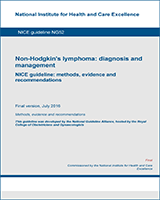From: 4, Management

Non-Hodgkin's Lymphoma: Diagnosis and Management.
NICE Guideline, No. 52.
National Guideline Alliance (UK).
London: National Institute for Health and Care Excellence (NICE); 2016 Jul.
Copyright © National Institute for Health and Care Excellence 2016.
All rights reserved. NICE copyright material can be downloaded for private research and study, and may be reproduced for educational and not-for-profit purposes. No reproduction by or for commercial organisations, or for commercial purposes, is allowed without the written permission of NICE.
NCBI Bookshelf. A service of the National Library of Medicine, National Institutes of Health.